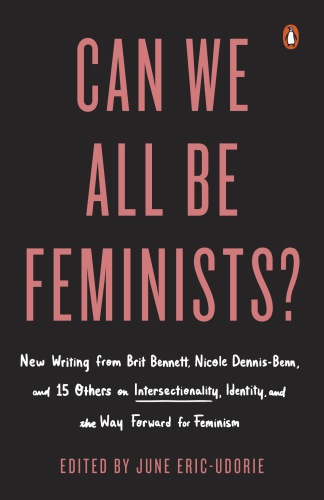
Can We All Be Feminists?
New Writing from Brit Bennett, Nicole Dennis-Benn, and 15 Others on Intersectionality, Identity, and the Way Forward for Feminism
فرمت کتاب
ebook
تاریخ انتشار
2018
نویسنده
June Eric-Udorieنویسنده
June Eric-Udorieشابک
9780525504351
کتاب های مرتبط
- اطلاعات
- نقد و بررسی
- دیدگاه کاربران
نقد و بررسی

August 1, 2018
A collection that aims to turn feminism's gaze away from an agenda largely set by privileged white women.In an eloquent and searing introduction, debut editor Eric-Udorie--an undergraduate at Duke University who was named Elle UK's Female Activist of the Year in 2017--takes white feminists to task for ignoring the stories, suffering, goals, and power of "women of color, disabled women, queer women, trans women, poor women, and other marginalized groups." The essays that follow examine everything from films about trans people to the death of Sandra Bland to body hair. Novelist Brit Bennett contributes an especially lyrical piece about the body-spirit dualism she learned as a young black girl in church. British journalist Aisha Gani offers a brilliant reading of the portrayal of Muslim women on TV ("a Muslim woman should not be newsworthy only if she is the first visibly Muslim woman in a particular field"). Several writers consider how political issues not always thought of as feminist problems--e.g., British immigration policy, cuts to Medicaid, the highly flawed American prison system--would look if seen through a feminist lens. One of the most incisive essays is by Frances Ryan, a columnist for the Guardian. She criticizes the way that disability typically features in abortion-rights discourse about abortion, discourse in which the prospect of being forced to raise a disabled child is held up as a specter of ghastliness meant to convince the likes of Phyllis Schlafly that abortion should be legal in at least some cases. This line of reasoning, Ryan notes, bolsters a cultural script in which disability is "something to be avoided at all costs." She also argues that a feminist approach to reproductive rights that took disability seriously would include a fight to protect the rights of disabled women to raise children.Eric-Udorie calls to mind a young Audre Lorde, and her anthology feels like a 21st-century version of This Bridge Called My Back.
COPYRIGHT(2018) Kirkus Reviews, ALL RIGHTS RESERVED.

September 1, 2018
Each of the essays in this collection, compiled by UK writer Eric-Udorie, address from different perspectives the challenges of identifying as feminist in light of intersectional struggles within a community. Eric-Udorie's introduction stresses the importance of intersectionality from a theoretical viewpoint. Interestingly, each piece to follow offers a testament to the idea that focus is appropriate, as each writer spotlights a particular issue of intersection. Writings in a variety of styles make the book useful for both scholars and general readers. Topics range from race to religion to disability and beyond. Poverty, however, is absent from the discussion. Standouts include work from Nicole Dennis-Benn, Evette Dionne, Brit Bennett, and Mariya Karimjee. The final essay discusses the plurality of feminism, citing novelist Roxane Gay to point out that not everyone's feminism is the same, which helps to acknowledge the flaw in Eric-Udorie's argument for a broad approach. VERDICT This anthology works excellently as a response to Chimamanda Ngozi Adichie's We Should All Be Feminists as it marks how feminism has historically excluded and alienated various groups while suggesting inclusive ways forward.--Abby Hargreaves, Dist. of Columbia P.L.
Copyright 2018 Library Journal, LLC Used with permission.

























دیدگاه کاربران